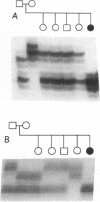Abstract
Uniparental disomy for maternal chromosome 7 has been described in three patients with recessive disorders. Short stature in each of these patients has been explained by the effect of imprinting of growth-related genes on maternal chromosome 7. Alternatively, although less likely, all these patients may be homozygous for a rare recessive mutation. Here we report both paternal isodisomy for chromosome 7 and normal growth in a patient with a recessive disorder, congenital chloride diarrhea. She had inherited only paternal alleles at 10 loci and was homozygous for another 10 chromosome 7 loci studied. Her physical status and laboratory tests were normal except for a mild high-frequency sensorineural hearing loss. As the patient has normal stature, it is likely that the paternal chromosome 7 lacks the suggested maternal imprinting effect on growth. Paternal isodisomy for human chromosome 7 may have no phenotypic effect on growth.
Full text
PDF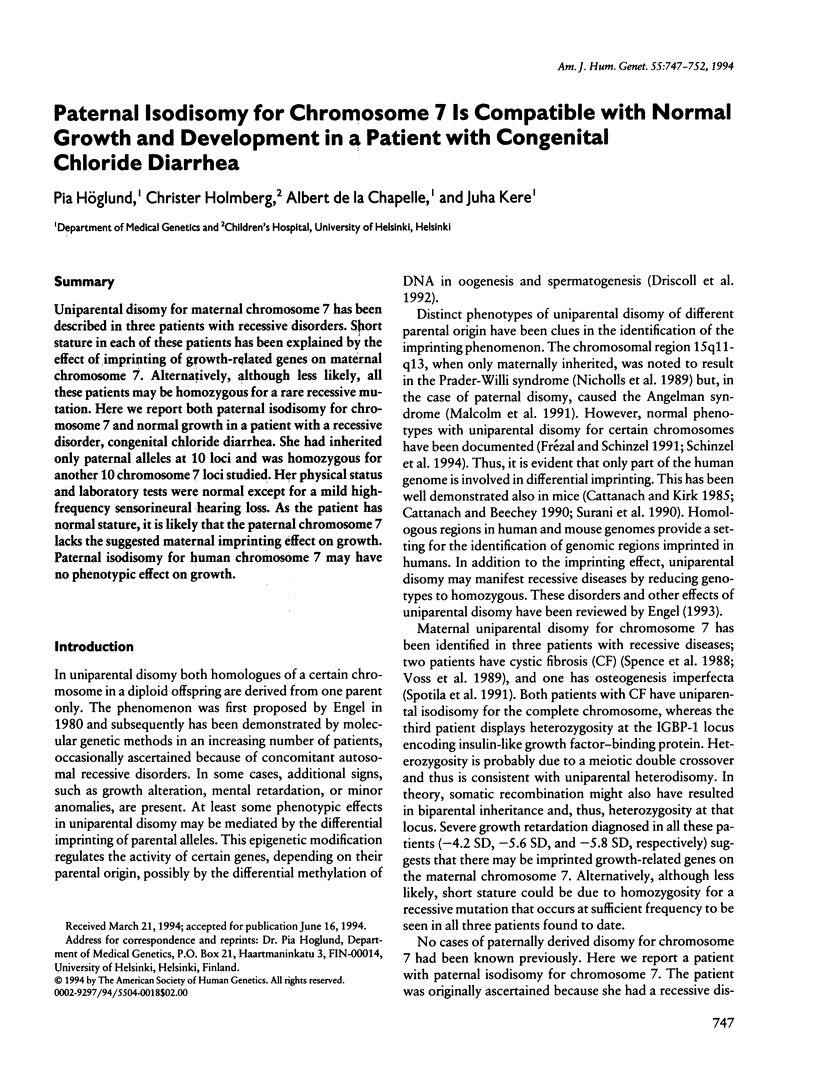
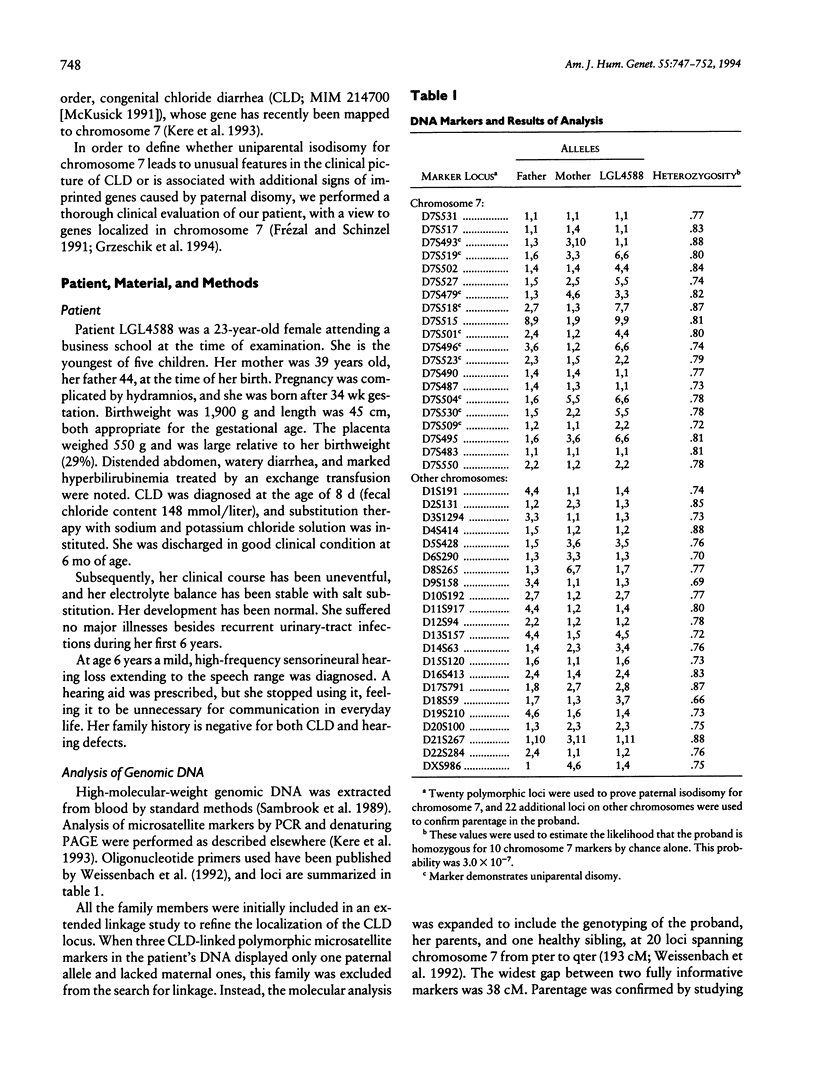
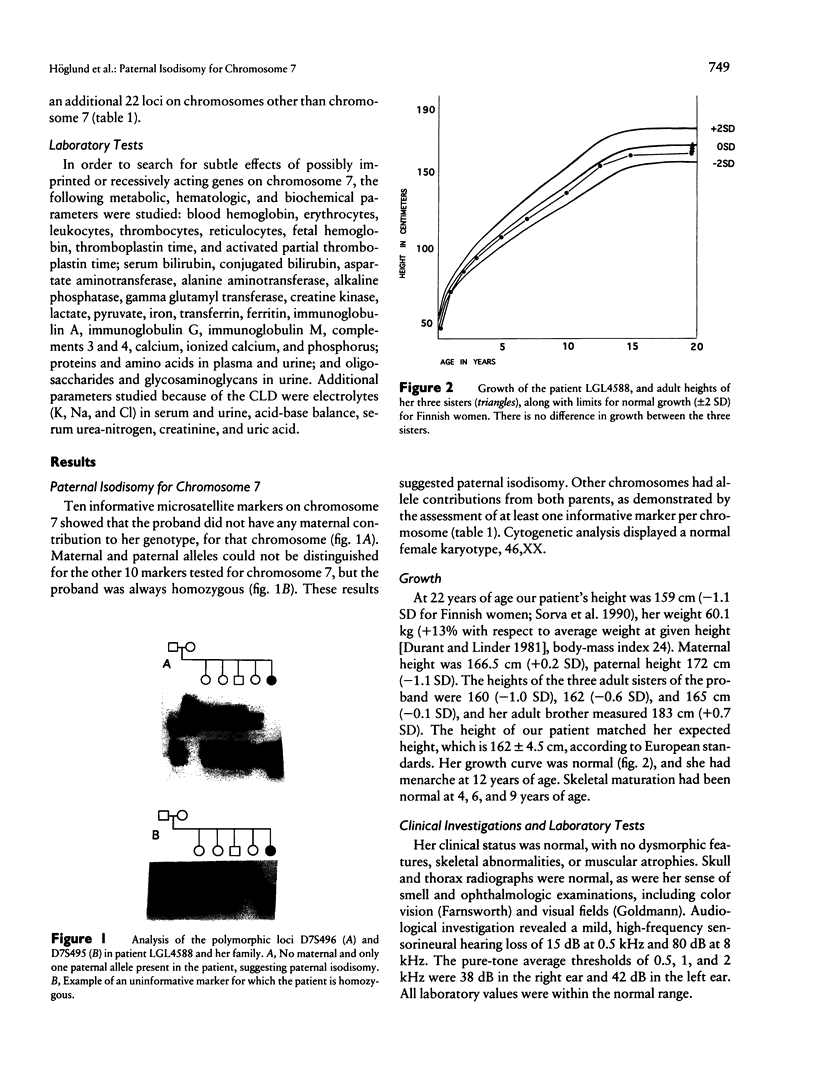
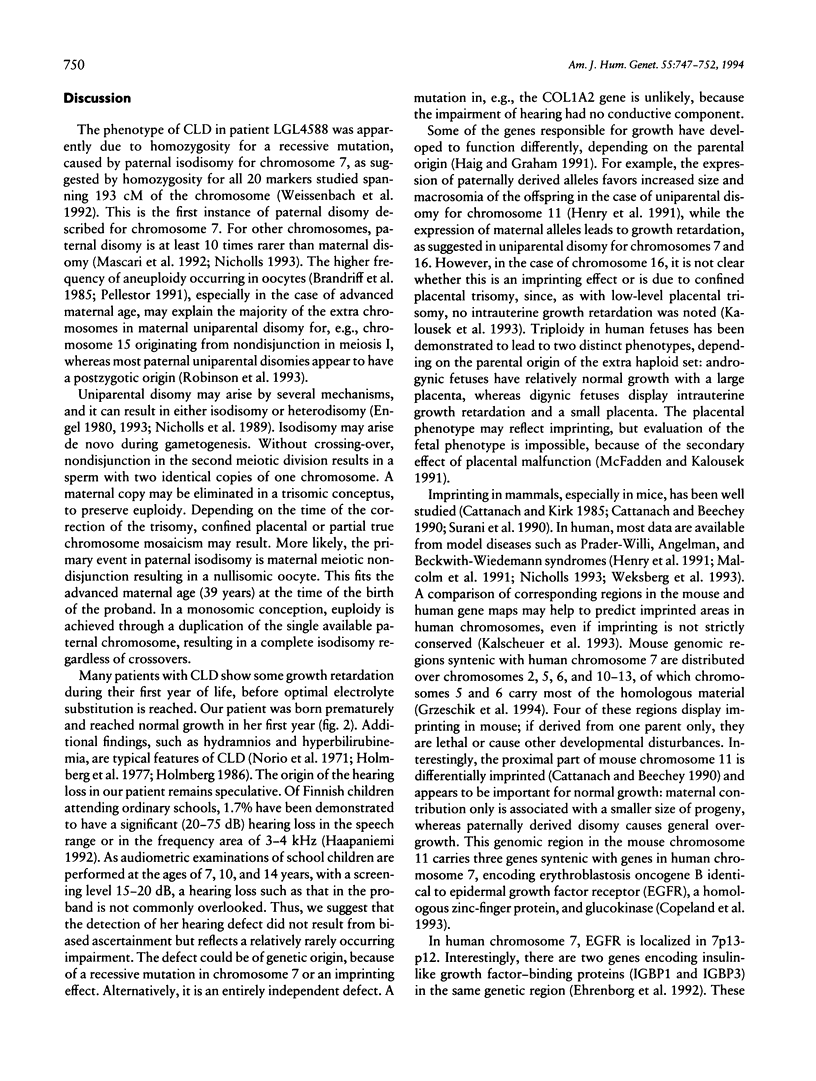
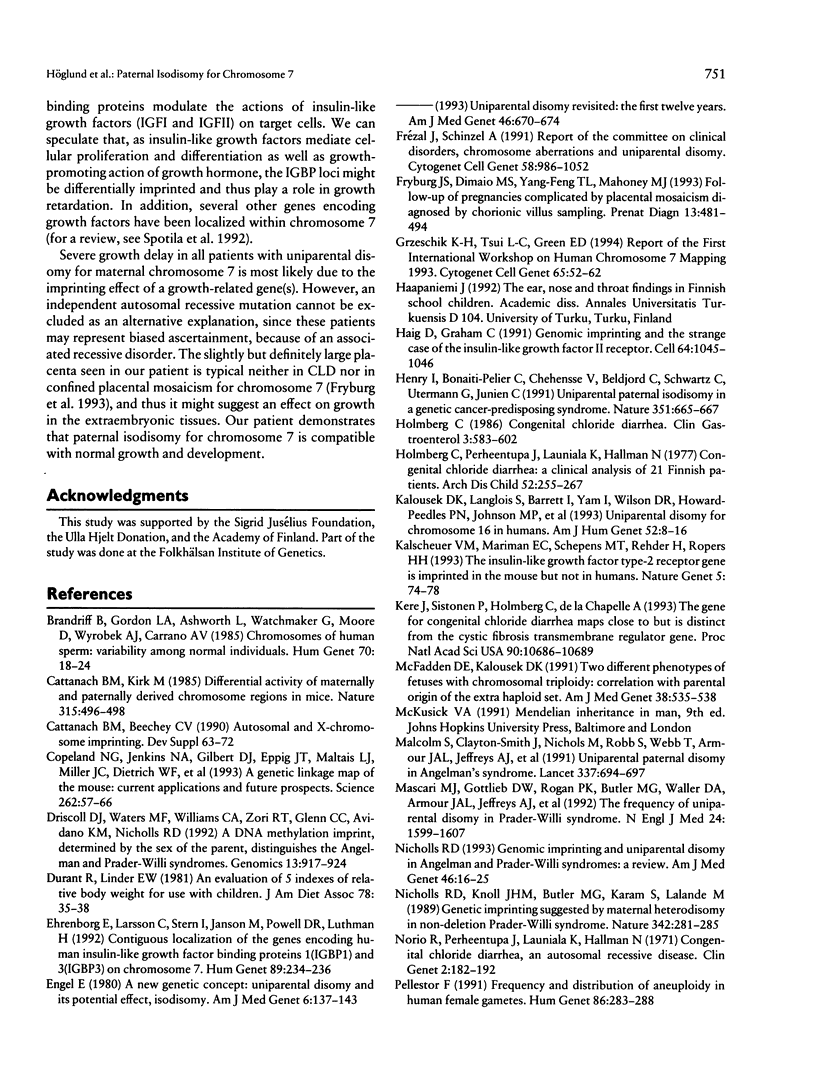
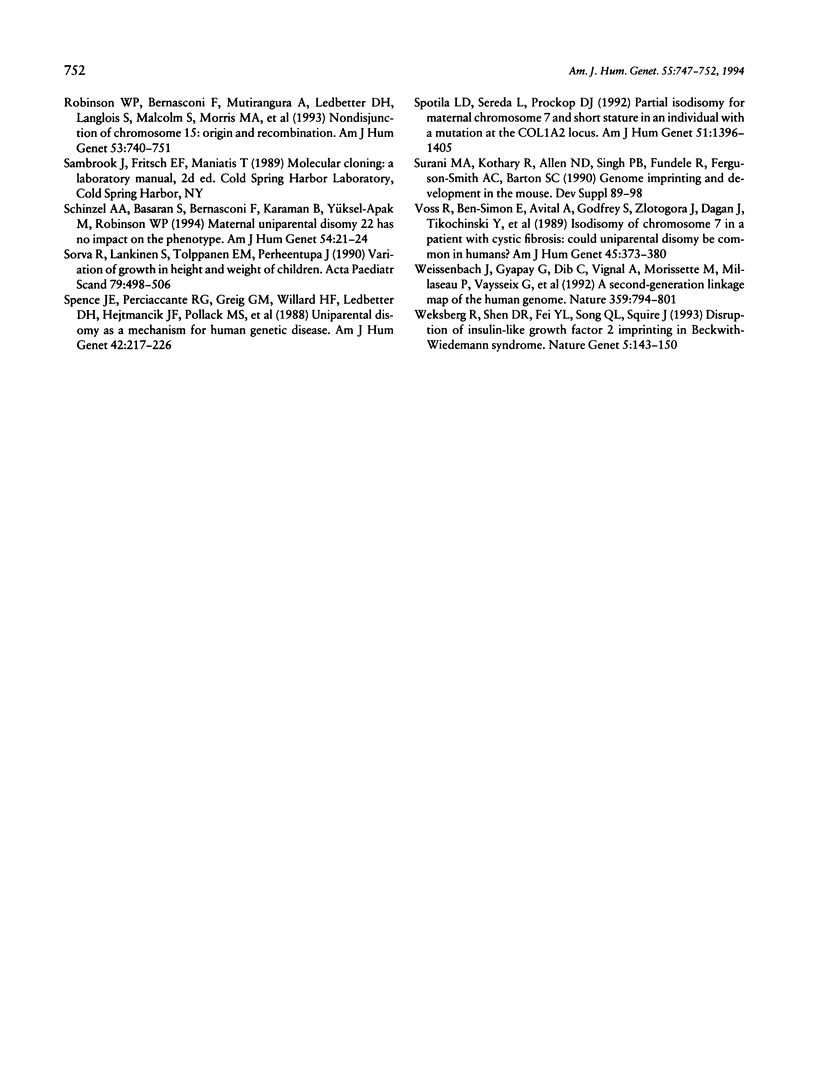
Images in this article
Selected References
These references are in PubMed. This may not be the complete list of references from this article.
- Bajalica S., Allander S. V., Ehrenborg E., Brøndum-Nielsen K., Luthman H., Larsson C. Localization of the human insulin-like growth-factor-binding protein 4 gene to chromosomal region 17q12-21.1. Hum Genet. 1992 May;89(2):234–236. doi: 10.1007/BF00217129. [DOI] [PubMed] [Google Scholar]
- Brandriff B., Gordon L., Ashworth L., Watchmaker G., Moore D., 2nd, Wyrobek A. J., Carrano A. V. Chromosomes of human sperm: variability among normal individuals. Hum Genet. 1985;70(1):18–24. doi: 10.1007/BF00389451. [DOI] [PubMed] [Google Scholar]
- Cattanach B. M., Beechey C. V. Autosomal and X-chromosome imprinting. Dev Suppl. 1990:63–72. [PubMed] [Google Scholar]
- Cattanach B. M., Kirk M. Differential activity of maternally and paternally derived chromosome regions in mice. Nature. 1985 Jun 6;315(6019):496–498. doi: 10.1038/315496a0. [DOI] [PubMed] [Google Scholar]
- Copeland N. G., Jenkins N. A., Gilbert D. J., Eppig J. T., Maltais L. J., Miller J. C., Dietrich W. F., Weaver A., Lincoln S. E., Steen R. G. A genetic linkage map of the mouse: current applications and future prospects. Science. 1993 Oct 1;262(5130):57–66. doi: 10.1126/science.8211130. [DOI] [PubMed] [Google Scholar]
- Driscoll D. J., Waters M. F., Williams C. A., Zori R. T., Glenn C. C., Avidano K. M., Nicholls R. D. A DNA methylation imprint, determined by the sex of the parent, distinguishes the Angelman and Prader-Willi syndromes. Genomics. 1992 Aug;13(4):917–924. doi: 10.1016/0888-7543(92)90001-9. [DOI] [PubMed] [Google Scholar]
- DuRant R. H., Linder C. W. An evaluation of five indexes of relative body weight for use with children. J Am Diet Assoc. 1981 Jan;78(1):35–41. [PubMed] [Google Scholar]
- Engel E. A new genetic concept: uniparental disomy and its potential effect, isodisomy. Am J Med Genet. 1980;6(2):137–143. doi: 10.1002/ajmg.1320060207. [DOI] [PubMed] [Google Scholar]
- Fryburg J. S., Dimaio M. S., Yang-Feng T. L., Mahoney M. J. Follow-up of pregnancies complicated by placental mosaicism diagnosed by chorionic villus sampling. Prenat Diagn. 1993 Jun;13(6):481–494. doi: 10.1002/pd.1970130610. [DOI] [PubMed] [Google Scholar]
- Grzeschik K. H., Tsui L. C., Green E. D. Report and abstracts of the First International Workshop on Human Chromosome 7 Mapping 1993. Cytogenet Cell Genet. 1994;65(1-2):52–73. [PubMed] [Google Scholar]
- Haig D., Graham C. Genomic imprinting and the strange case of the insulin-like growth factor II receptor. Cell. 1991 Mar 22;64(6):1045–1046. doi: 10.1016/0092-8674(91)90256-x. [DOI] [PubMed] [Google Scholar]
- Henry I., Bonaiti-Pellié C., Chehensse V., Beldjord C., Schwartz C., Utermann G., Junien C. Uniparental paternal disomy in a genetic cancer-predisposing syndrome. Nature. 1991 Jun 20;351(6328):665–667. doi: 10.1038/351665a0. [DOI] [PubMed] [Google Scholar]
- Holmberg C. Congenital chloride diarrhoea. Clin Gastroenterol. 1986 Jul;15(3):583–602. [PubMed] [Google Scholar]
- Holmberg C., Perheentupa J., Launiala K., Hallman N. Congenital chloride diarrhoea. Clinical analysis of 21 Finnish patients. Arch Dis Child. 1977 Apr;52(4):255–267. doi: 10.1136/adc.52.4.255. [DOI] [PMC free article] [PubMed] [Google Scholar]
- Human gene mapping 11. London Conference (1991). Eleventh International Workshop on Human Gene Mapping. London, UK, August 18-22, 1991. Cytogenet Cell Genet. 1991;58(3-4):986–2156. doi: 10.1159/000133716. [DOI] [PubMed] [Google Scholar]
- Kalousek D. K., Langlois S., Barrett I., Yam I., Wilson D. R., Howard-Peebles P. N., Johnson M. P., Giorgiutti E. Uniparental disomy for chromosome 16 in humans. Am J Hum Genet. 1993 Jan;52(1):8–16. [PMC free article] [PubMed] [Google Scholar]
- Kalscheuer V. M., Mariman E. C., Schepens M. T., Rehder H., Ropers H. H. The insulin-like growth factor type-2 receptor gene is imprinted in the mouse but not in humans. Nat Genet. 1993 Sep;5(1):74–78. doi: 10.1038/ng0993-74. [DOI] [PubMed] [Google Scholar]
- Kere J., Sistonen P., Holmberg C., de la Chapelle A. The gene for congenital chloride diarrhea maps close to but is distinct from the gene for cystic fibrosis transmembrane conductance regulator. Proc Natl Acad Sci U S A. 1993 Nov 15;90(22):10686–10689. doi: 10.1073/pnas.90.22.10686. [DOI] [PMC free article] [PubMed] [Google Scholar]
- Malcolm S., Clayton-Smith J., Nichols M., Robb S., Webb T., Armour J. A., Jeffreys A. J., Pembrey M. E. Uniparental paternal disomy in Angelman's syndrome. Lancet. 1991 Mar 23;337(8743):694–697. doi: 10.1016/0140-6736(91)90278-w. [DOI] [PubMed] [Google Scholar]
- Mascari M. J., Gottlieb W., Rogan P. K., Butler M. G., Waller D. A., Armour J. A., Jeffreys A. J., Ladda R. L., Nicholls R. D. The frequency of uniparental disomy in Prader-Willi syndrome. Implications for molecular diagnosis. N Engl J Med. 1992 Jun 11;326(24):1599–1607. doi: 10.1056/NEJM199206113262404. [DOI] [PMC free article] [PubMed] [Google Scholar]
- McFadden D. E., Kalousek D. K. Two different phenotypes of fetuses with chromosomal triploidy: correlation with parental origin of the extra haploid set. Am J Med Genet. 1991 Mar 15;38(4):535–538. doi: 10.1002/ajmg.1320380407. [DOI] [PubMed] [Google Scholar]
- Nicholls R. D. Genomic imprinting and uniparental disomy in Angelman and Prader-Willi syndromes: a review. Am J Med Genet. 1993 Apr 1;46(1):16–25. doi: 10.1002/ajmg.1320460106. [DOI] [PubMed] [Google Scholar]
- Nicholls R. D., Knoll J. H., Butler M. G., Karam S., Lalande M. Genetic imprinting suggested by maternal heterodisomy in nondeletion Prader-Willi syndrome. Nature. 1989 Nov 16;342(6247):281–285. doi: 10.1038/342281a0. [DOI] [PMC free article] [PubMed] [Google Scholar]
- Norio R., Perheentupa J., Launiala K., Hallman N. Congenital chloride diarrhea, an autosomal recessive disease. Genetic study of 14 Finnish and 12 other families. Clin Genet. 1971;2(3):182–192. [PubMed] [Google Scholar]
- Pellestor F. Frequency and distribution of aneuploidy in human female gametes. Hum Genet. 1991 Jan;86(3):283–288. doi: 10.1007/BF00202410. [DOI] [PubMed] [Google Scholar]
- Robinson W. P., Bernasconi F., Mutirangura A., Ledbetter D. H., Langlois S., Malcolm S., Morris M. A., Schinzel A. A. Nondisjunction of chromosome 15: origin and recombination. Am J Hum Genet. 1993 Sep;53(3):740–751. [PMC free article] [PubMed] [Google Scholar]
- Schinzel A. A., Basaran S., Bernasconi F., Karaman B., Yüksel-Apak M., Robinson W. P. Maternal uniparental disomy 22 has no impact on the phenotype. Am J Hum Genet. 1994 Jan;54(1):21–24. [PMC free article] [PubMed] [Google Scholar]
- Sorva R., Lankinen S., Tolppanen E. M., Perheentupa J. Variation of growth in height and weight of children. II. After infancy. Acta Paediatr Scand. 1990 May;79(5):498–506. doi: 10.1111/j.1651-2227.1990.tb11503.x. [DOI] [PubMed] [Google Scholar]
- Spence J. E., Perciaccante R. G., Greig G. M., Willard H. F., Ledbetter D. H., Hejtmancik J. F., Pollack M. S., O'Brien W. E., Beaudet A. L. Uniparental disomy as a mechanism for human genetic disease. Am J Hum Genet. 1988 Feb;42(2):217–226. [PMC free article] [PubMed] [Google Scholar]
- Spotila L. D., Sereda L., Prockop D. J. Partial isodisomy for maternal chromosome 7 and short stature in an individual with a mutation at the COL1A2 locus. Am J Hum Genet. 1992 Dec;51(6):1396–1405. [PMC free article] [PubMed] [Google Scholar]
- Surani M. A., Kothary R., Allen N. D., Singh P. B., Fundele R., Ferguson-Smith A. C., Barton S. C. Genome imprinting and development in the mouse. Dev Suppl. 1990:89–98. [PubMed] [Google Scholar]
- Voss R., Ben-Simon E., Avital A., Godfrey S., Zlotogora J., Dagan J., Tikochinski Y., Hillel J. Isodisomy of chromosome 7 in a patient with cystic fibrosis: could uniparental disomy be common in humans? Am J Hum Genet. 1989 Sep;45(3):373–380. [PMC free article] [PubMed] [Google Scholar]
- Weissenbach J., Gyapay G., Dib C., Vignal A., Morissette J., Millasseau P., Vaysseix G., Lathrop M. A second-generation linkage map of the human genome. Nature. 1992 Oct 29;359(6398):794–801. doi: 10.1038/359794a0. [DOI] [PubMed] [Google Scholar]
- Weksberg R., Shen D. R., Fei Y. L., Song Q. L., Squire J. Disruption of insulin-like growth factor 2 imprinting in Beckwith-Wiedemann syndrome. Nat Genet. 1993 Oct;5(2):143–150. doi: 10.1038/ng1093-143. [DOI] [PubMed] [Google Scholar]



